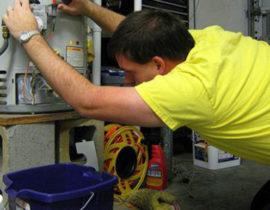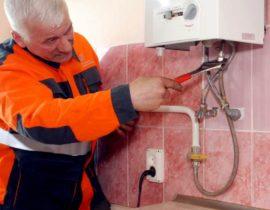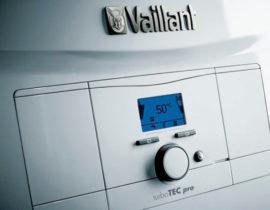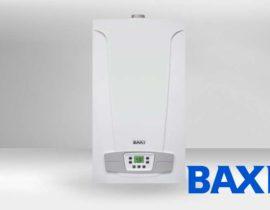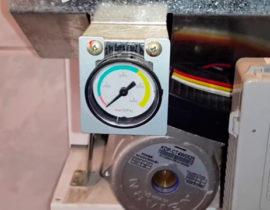Gas equipment, even with scheduled preventive cleanings, may malfunction. But for each breakdown there is a reason, knowing which you can maximize the life of the boilers, saving a decent amount of money.
Before analyzing the main types of malfunctions in boilers, it is worth noting that any repair and scheduled maintenance work should be carried out exclusively by specialists who are authorized to provide these services.
Content
- The boiler ignited, started to warm up, but automatically turned off and does not restart
- The boiler spontaneously goes out
- Gauge pressure drop rapidly
- The boiler is running at high power, and the batteries are slightly warm
- The display shows incorrect errors
- Noise and whistle in the boiler when it starts
- General Tips and Tricks
The boiler does not ignite
No matter how ridiculous it may sound, but in 95% of cases of all requests for technical assistance for the repair of gas equipment, it is this problem that people experience most often. This is especially true for the first ignition after a long stay of the boiler in the off state.
The reasons
Consider the reasons from the most banal to serious breakdowns:
- There is no gas supply in the system: the valve on the pipe is closed or there is no gas directly in the room.
- The boiler is not plugged in: there is no spark, the flame cannot be ignited, although there is a slight smell of gas.
- The hood is closed: the boiler gives a spark, there is ignition, but the flame goes out very quickly.
- Blown fuses on the electronic board: often happens with sudden power surges in the network.
- Problems with the ionization electrode: either moved away from the board, or burned out completely.
It is not difficult to determine “by eye” why a gas boiler does not ignite, therefore, before cutting off the phones of service departments, first of all, check yourself: have you done everything to light the boiler?
 How to solve a problem?
How to solve a problem?
First of all, we check the following:
- Is the gas and extractor open?
- Is the boiler and pump plugged in?
- Is the heating system filled with water to the required pressure?
Only after the gas equipment is actually ready to be ignited can it be started to ignite it.
So, if the above did not help, then the problem lies much deeper than it seems. In this case, check the following:
- Is there contact between the ionization electrode and the board.
- Is there a spark when ignited.
- Is it possible to get at least a small flame for a few seconds.
After that, you should contact the service department and call the wizard. Dismantling the boiler, and even more so disconnecting boards, controllers and wiring, without knowledge and skills, can be extremely life-threatening.
The boiler ignited, started to warm up, but automatically turned off and does not restart
This problem also accompanies "forgetful" people who ignore filling the heating system with water before starting the ignition. The fact is that gas boilers have thermostats that, if heated too quickly, send a signal to the central board about the need for an emergency shutdown of the boiler. This measure is necessary in order to avoid a possible explosion of the gas boiler due to high temperatures.
The reasons
In fact, there are not so many reasons for such a malfunction:
- The pump is not included in the network: accordingly, the heating element quickly overheats, and the water does not circulate through the system, but is concentrated in the boiler.
- The pump is connected to the network, but is faulty: water is not circulating or is circulating, but very slowly (slower than heating).
- The batteries are air-filled: a large amount of air has accumulated in the batteries, which by its nature heats up faster than water.
- Malfunctions in the thermostat: the controller burned out, or the wiring oxidized.
Be sure to check the readiness of your own heating system for the first start-up. The lack of the required water level and pressure leads to an emergency shutdown of gas equipment.
How to solve a problem?
The list of what you can do yourself without calling the wizard:
- Fill the heating system with water: open the water supply valve or add to the expansion tank to the mark on the pressure gauge recommended by the manufacturer.
- Unscrew the nuts on the batteries to release excess air. This must be done on each coolant separately until water begins to drip.
- Check that the pump is working properly. In some cases, increasing its power and speed helps.You can put your ear to the pump and hear if it works or not.
The boiler spontaneously goes out
This problem indicates the presence of weak draft in the exhaust system, or in malfunctions of the central board, which block the operation of gas equipment.
 The reasons
The reasons
Flame extinction occurs in such cases:
- The hood is clogged with foreign objects: often in the summer, rags or paper are put into the hood to avoid insects from entering the home.
- A large accumulation of soot and decay products, the hood has never been cleaned during long-term operation.
- Defects in the operation of the central board, which generates a false signal to stop the combustion process.
If you want the gas boiler to serve faithfully for a long time, then do not forget to clean it, paying special attention to the hood.
How to solve a problem?
First, check if the hood is open and does not need to be cleaned? If this option did not help, then you should call the wizard, who will check all systems and find out if why does the boiler go out.
Gauge pressure drop rapidly
The situation is as follows: you filled the heating system with water, raised the pressure gauge to the recommended values, started the boiler, but after a certain time noticed that the batteries were cold, and the boiler itself turned off. This is due to the operation of the thermostat and protection, which turn off the gas supply if the pressure level in the heating system has reached its minimum limit.
The reasons
This pattern appears in several cases:
- You forgot to add water to expansion tank.
- They opened the tap for supplying water to the heating system, but forgot to fix it, and when the water was turned off at the central water supply, the water left on its own.
- There are various kinds of leaks that gradually reduce the water level in the system.
Again, you need to check how exactly the pressure gauge does its job. Rarely, but it happens that this device does not work properly, blocking the performance of the entire heating system.
 How to decide?
How to decide?
- First, check that the water in the expansion tank is above the minimum value.
- Secondly, inspect the water supply tap if it is taken directly from the public water supply. Perhaps you forgot to close the faucet, or the faucet itself is faulty and leaking.
- Third, inspect all existing batteries and pipes for leaks. If they are, then you have to repair.
Problems related to the malfunction of the board, controllers or other parts can only be solved with the participation of experienced specialists.
The boiler is running at high power, and the batteries are slightly warm
This problem is inevitable if your equipment has been in operation for more than 7 years. This is due to scale on the heat exchanger, which is formed with frequent changes of water in the heating system.
The reasons
The key reason is scale on the heat exchanger tubes, which significantly narrows their clearance. As a result, at the same gas flow rate, the heat transfer process is significantly reduced.
How to decide?
If the pump is working, but with a significant gas flow, there is no heat in the house, then you need to clean the heat exchanger. The procedure is performed only by specialists who use special liquids of high acidity.
The display shows incorrect errors
The boiler went out for some reason, and a code appeared on the display.Naturally, the first thought is to look into the instruction manual, but what if there is no such code there?
The reasons
A common cause of malfunctions in boiler automation is the wiring or failure of small board components. This happens with frequent power surges in the network, so experts recommend always connecting a gas boiler to the network through a voltage stabilizer.
How to decide?
The problem can only be solved with the help of experienced professionals. It is almost impossible to “cure” incorrect errors on your own. And no restarts of the equipment will save if the reason is in the electrics.
Noise and whistle in the boiler when it starts
An ordinary serviceable gas boiler operates relatively silently. The noises and whistles that occur during its automatic activation should alert. This may indicate a number of reasons that should be eliminated as quickly as possible.
 The reasons
The reasons
The loud operation of the equipment is caused by the following possible reasons:
- Lack of water in the heating system, the presence of airiness - be sure to check the pressure gauge, as well as bleed air from each battery.
- The formation of scale in the coolant, which breaks off with a temperature difference and contributes to overheating of the antifreeze.
If the boiler becomes noisy - do not ignore it, but immediately call a specialist to find and fix the problem.
How to decide?
The problem is usually solved with purges heat exchanger with special acid compositions. Secondarily, the state of the heating system is assessed, excess air is removed from the batteries.
General Tips and Tricks
Gas equipment jokes are bad, so all repairs should be carried out only by experts in the industry.If you have the slightest suspicion that the boiler is not working the way it was before, then you should not hesitate to call the masters.
Experts also recommend:
- Don't Ignore Your Annual Routine Inspection serviceability of gas equipment. The craftsmen will clean the heat exchanger and look inside the boiler. If there are faults, they will be fixed. This will maximize the life of the boiler, as well as save your life from possible risks.
- Never repair the boiler yourselfusing a guide found on the internet. This does not guarantee the full serviceability of the equipment, which is fraught with negative consequences.
- Pay attention to the nuances of operation the model you have chosen. Do not be lazy to study the documentation, which describes in detail the sequence of actions in a given situation.
In conclusion, it is worth noting that all problems in gas equipment sooner or later make themselves felt. Operation of faulty equipment can lead to a gas explosion, which is extremely life-threatening. Take all precautions and do not ignore operating rules gas equipment.
Video advice on how to lower high pressure in a gas boiler











